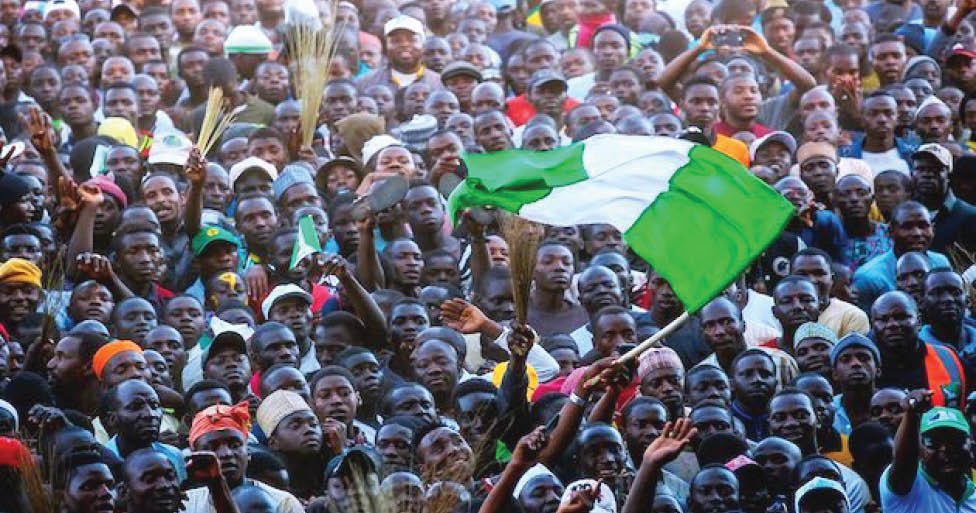It is February 2023, the month of Nigeria’s presidential election.
Except that there is barely Nigeria. Citizens are lacking. They lack a country with life or purpose or heart or justice or a map to the future.
Because although there is something of an outgoing and an incoming leadership, they lack guidance or direction. Nigeria’s 200 million people lack access to money: even their own.
What does it mean? They lack essentials: food, petrol, medicine. Those who have cannot sell. Those who want cannot buy. Those who go out may not return.
The only business in operation is the desperation of some of the political elite, particularly those who are responsible for the chaos.
Consider then that Atiku Abubakar, the presidential candidate of PDP, in pursuit of the presidency, last week sought solace and support in the institutional memory of the palace of the Emir of Kano.
“We were on a courtesy call to the palace sometime while I was the Vice President of Nigeria, then late Emir Ado Bayero said he saw among us somebody who was going to be President and who would bring greatness to Nigeria,” Atiku told the current Emir, Alhaji Aminu Ado Bayero.
The PDP candidate said he believed he was the person to whom the late Emir had alluded. To that end, then, the current Emir was to pray, as his father had allegedly done, for Atiku to achieve the dreams of the late Bayero.
President Muhammadu Buhari, the author of the chaos, was similarly on the campaign trail, allegedly for his APC presidential candidate, Bola Ahmed Tinubu, who dangled him in an appearance before the Sultan of Sokoto, Alhaji Muhammad Sa’ad Abubakar III.
It was a trip the Nigeria leader should never have taken because it is widely known that the esteemed Sultan holds him in disdain.
Among others, in February 2021 in a statement through the Jama’atu Nasril Islam, the umbrella body of northern Muslims that he heads, the Sultan challenged the Buhari administration over the abduction of 29 students of Government Science College, Kagara, Niger State, two months after over 300 students suffered the same fate in Kankara, Katsina State, declaring that the bandits and Boko Haram were the same.
In April 2022, following the attack on the Abuja-Kaduna train in which many citizens were kidnapped, the Sultan openly castigated any government that is incapable of protecting its citizens, saying it had lost the moral justification for being in power.
In May 2022, the Sultan tasked the government to identify the so-called ‘unknown gunmen’ and force them out of forests and urban hideouts for prosecution. He stressed that the term that was being used to describe killers of innocent Nigerians was no longer tenable because they were ignored, not unknown.
Since then, Nigeria has grown even more insecure, with a lot of families losing loved ones and sometimes possessions as well as they pay ransoms. On many occasions, the Sultan personally stated last September, he had warned Buhari that all was not well.
Consider then, that it is to the same Sultan that Mr. Tinubu last week paraded Buhari as his trump card during his campaign visit.
“We want to win election [sic], and we seek your blessing and endorsement,” he told the Emir. “It is something you cannot reject. I request you…because the president and commander in chief of the armed forces…how can he be here and you reject it?”
It was comical. The Emir, probably wondering at being invited to endorse a comprehensively-deficient candidate sponsored by a insufferable government, appeared to be amused. Buhari, who has encouraged Nigerians, at least openly, to vote for anyone of whatever party, appeared to be bored.
Remember, during all of that, Nigerians starved. They could neither feed their children nor buy medicine for their sick. The haves had the same as the have-nots.
Unless, of course, you were Godwin Emefiele, the governor of the Central Bank of Nigeria, the Tunde Idiagbon to Muhammadu Buhari in the currency mess.
Buhari likes to present Emefiele as special, knowing all the time that his record is of a corrupt and incompetent official who would have been relieved of his position a long time ago by a competent administration.
One newspaper last month profiled the major crimes of Emefiele within the Nigerian economy. But as far back as March 2016 his character had been exposed—as an operative who would rather curry favour than execute his office—in the secret recruitment of children and relatives of influential Nigerians, including Buhari himself. Two years prior, another report demonstrated that his CBN had illegally and secretly hired over 900 persons.
It may also be recalled that Emefiele was a prominent figure in the Sambo Dasuki $2.1 billion arms scandal, and in the CBN’s efforts to help the PDP to finance the 2015 presidential election. In 2017, he was identified in the Paradise Papers him as illegally holding a stake in at least three companies in offshore tax havens.
Of course, everyone remembers how, also ignoring the law, Emefiele last year decided to run for president even as he continued to hold the job of CBN governor. For him was no problem paying the absurd N100m required simply to obtain the documentation.
And yet, with a background as corrupt and inept as this, it is in Emefiele’s hands and heart that Buhari chose to abandon the CBN and a predictably difficult currency transition.
Finally, then: Ahmad Lawan. The Senate President, who did not bother to participate in his party’s Senate primary in his Yobe North Senatorial constituency in May 2022. He had his eyes on becoming president.
But then, like Emefiele and tens of others in APC, he would discover that he could gain no traction for that ambition. He raced back to Yobe North, but the seat had been won by Bashir Machina.
A lower court subsequently affirmed that victory, and the Appeal Court agreed: a man cannot win a game in which he did not even play.
But last week, by a 3-2 split decision, the Supreme Court mysteriously ruled for Lawan in a case in which he had given up, but APC decided to appeal the Appeal Court’s verdict.
The dissenting Supremes said that the APC appeal was devoid of merit, describing the APC primary election of 9 June 2003, which somehow produced Mr Lawan, as an “illegal contraption.” It was not monitored by the electoral commission, as the law requires.
They pointed out that Mr Lawan’s withdrawal from the Yobe North Senatorial District race in May to chase the presidency automatically disqualified him from the National Assembly election.
Only three years ago in the Senate, Lawan himself had vilified such injustice, describing Nigeria as a place where people with money buy [court] judgements. “That is not the kind of ideal society that we want,” he asserted.
The problem is that while Buhari continues to advertise a “credible election,” Lawan has just purchased the exact same injustice for APC against Machina.
Nigerians may be starving, but they are also watching.
- This column welcomes rebuttals from interested government officials.


 Join Daily Trust WhatsApp Community For Quick Access To News and Happenings Around You.
Join Daily Trust WhatsApp Community For Quick Access To News and Happenings Around You.


